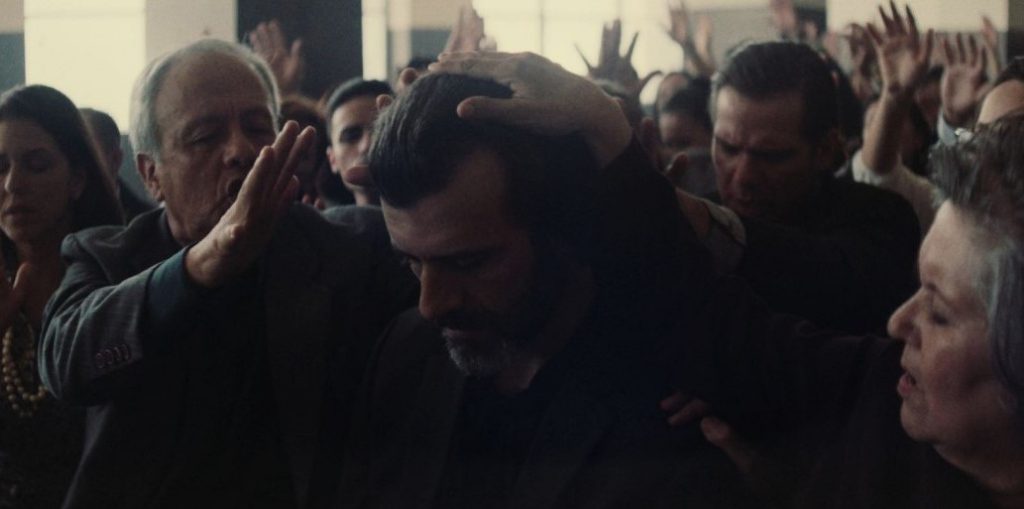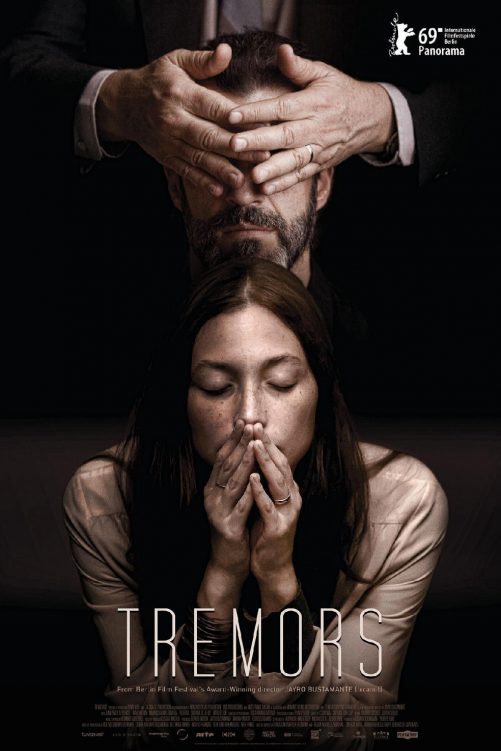Tremors (Temblores)

In Temblores, or Tremors, we are transported to Guatemala City where 40-year-old Pablo (Juan Pablo Olyslager) has what is considered in his Evangelical Christian community to be the perfect life: married to a beautiful woman (Diane Bathen), father to two lovely children, part of a loving family, financially secure and professionally successful, he is known as a “good man”. He has it all. However, when he falls in love with a man named Francisco (Mauricio Armas Zebadúa), this image is shattered. As volcanic tremors shake the very ground of the city on which he stands, so the foundations of his and his family’s entire worldview are shaken to the core.
Judged by those around him to have sinned and even accused of being a paedophile, Pablo is fired from his job and banished from seeing his children over concerns for their safety. His new life sharing an apartment with his lover provokes disgust and his parents and brother implore him to renounce his newly realised sexuality as sin. Even his former house staff turn against him in order to keep their jobs. Wholly ostracised from his former life, the protagonist eventually agrees to enter a programme with the Church designed to help “heal” and cure him of his “abnormality”. A course of quasi-religious therapy alongside other sinning males ensues, involving everything from testing his faith to abstinence, injections in intimate places to wrestling to recover his “masculinity”.
Temblores comes in the wake of a slew of films dealing with LGBT themes and more specifically gay conversion therapy, such as US-based The Miseducation of Cameron Post from Desiree Akhavan and Joel Edgerton’s Boy Erased. With Temblores, Guatemalan director and screenwriter Jayro Bustamante studies similar issues of how non-heterosexuality can still clash with tradition and religious beliefs. Here, we are immersed in an Evangelical Christian Guatemalan community where the reaction to Pablo’s revelation and his subsequent treatment reveals a deeply repressive society.
Akin to Sebastián Lelio’s use of dull blues and beiges in contrast to the forbidden desire between two women in the London Orthodox Jewish community in recent Disobedience, Bustamante’s choice of colour palette gives a drabness to proceedings, interrupted by rawness and authenticity of the desire between Pablo and Francisco. Plus the spaces we find them in – the gritty gay bar, their run-down apartment – sit in direct contrast to the affluent grandeur yet prudish sterility of the family home and the Church.
Actor Juan Pablo Olyslager in particular brings a complexity and nuance to the role of Pablo, reflecting an inner conflict between his own faith and commitment to his family, wife and kids and the need to follow through his desires and become his true self; a feeling of guilt and shame and that of liberation; of internalising the judgements of his peers and wanting to confront them.
Through the bearded, muscular, alternately sharp-suited and stark-naked figure of Olyslager, Bustamante also explores ideas of masculinity, the male form and stereotypes of homosexuality, questioning, as Pablo’s family and Pablo himself do: what makes a man?
While challenging and troubling, Temblores is a beautifully shot and well-executed film offering a fascinating insight into the structures that still stifle and stringently repress those who want to live and love outside of the traditional rules.
Sarah Bradbury
Tremors (Temblores) does not have a UK release date yet.
Read more reviews from our Berlin Film Festival 2019 coverage here.
For further information about the event visit the Berlin Film Festival website here.
Watch a clip from Tremors (Temblores) here:


























Facebook
Twitter
Instagram
YouTube
RSS